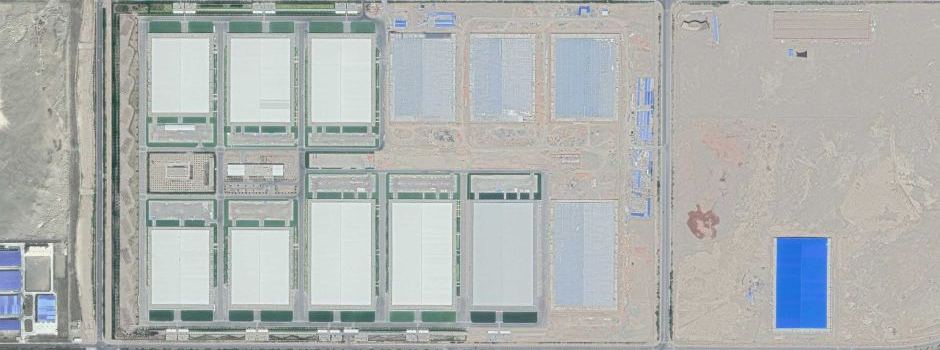Updated
Cotton On and Target Australia have stopped sourcing cotton from China’s Xinjiang province due to concerns about mass human rights abuses there by Chinese authorities.
Cotton On Group completed an internal investigation into its supply chain after Four Corners revealed in July that Uyghur Muslims were being rounded up as part of a detention program and forced to work in textile factories in Xinjiang.
Four Corners also revealed that Target Australia was already conducting an internal review into where it sourced its cotton from in Xinjiang.
The Australian branches of Jeanswest, Dangerfield, Ikea and H&M were also revealed to source cotton from Xinjiang, which is described by the UN as resembling a “mass internment camp”.
Cotton On sourced cotton from Xinjiang-based subcontractors Litai Textiles.
The company confirmed that last year that a Cotton On staff member visited the Litai Textiles factory, which is located just six kilometres away from a massive re-education camp.
Cotton On said it no longer sourced from Litai Textiles and that it was “absolutely committed to having an ethical supply chain”.
As a result of an internal investigation into supplies sourced from a mill owned by the company Huafu in Xinjiang province, Target Australia said it has now “made the decision to stop orders from that mill.”
International brand H&M also works with Huafu but has said that the yarn sourced from the company comes from a facility outside Xinjiang province.
The company told Four Corners that it also requested access to Huafu’s spinning facilities inside the province and their investigations “showed no evidence of forced labour”.
In early 2017, the Communist Party began a new incarceration campaign, rounding up, detaining and forcibly indoctrinating Uyghurs and other Muslim minority ethnic groups in the far-western region.
Islam has effectively been outlawed, with people routinely labelled as extremists and imprisoned for practising their religion.
Many of those not detained have had their passports seized and live under constant surveillance.
Mounting evidence suggests detainees are being forced to work in Xinjiang, with reports people are isolated from their families and threatened that if they don’t obey they will be returned to the camps or imprisoned.
Xinjiang is China’s largest cotton growing area and questions still remain about the cotton supply of many other well-known Australian brands.
Just Group, which owns Just Jeans, Dotti, Jacqui E, Peter Alexander, Portmans and Jay Jays, sources 84 per cent of its products from China but would not tell Four Corners which regions the goods came from or rule out that they were from Xinjiang.
Similarly the Noni B group, which owns Rockmans, Katies, Liz Jordan, W.Lane, Table Eight, Rivers, Millers, Crossroads and Autograph, said China was one of its four main suppliers and would not rule out that products came from Xinjiang.
 PHOTO: Workers walk by the perimeter fence of what is officially known as a vocational skills education centre in Xinjiang. (Reuters: Thomas Peter)
PHOTO: Workers walk by the perimeter fence of what is officially known as a vocational skills education centre in Xinjiang. (Reuters: Thomas Peter)An expert on China’s forced labour in Xinjiang, Adrian Zenz, previously told Four Corners it would soon become impossible to determine whether products made in Xinjiang were made with labour from former detainees or not.
“Western companies stand an increasing risk of having products made by forced or at least highly involuntary labour somewhere in the supply chains. It’s going to become inevitable as the scheme is unfolding and getting bigger and bigger,” he said.
Associated Press last week reported the Trump administration had blocked a shipment of baby pyjamas due to be sold at Costco Warehouses over concerns they had been made by Uyghurs forced to sew clothes against their will.
Mr Zenz will be testifying before the US Congressional Executive Commission on China in Washington on Thursday.
“The Costco case shows how close the West is now in directly supporting forced minority labour in Xinjiang, allowing Beijing to reap profits from its oppression there and to finance its police state through labour exploitation.
“The US Government decision to put a detention order on shipments from Hetian Taida is an important response and other governments must follow,” Dr Zenz said.
Earlier this month, the US placed visa restrictions on Chinese Government officials suspected of repressing Uyghurs and other ethnic minorities.
It also restricted the export of US products to 28 Chinese Government and business entities identified as playing a role in “brutal suppression” of Muslims in China.
In response, the Chinese embassy in the United States tweeted: “Xinjiang affairs are purely China’s internal affairs that allow no foreign interference. We urge the US to correct its mistakes at once and stop its interference in China’s internal affairs.”





Leave a Reply